Dapoxetine and Erectile Dysfunction: Side Effects or Uses?
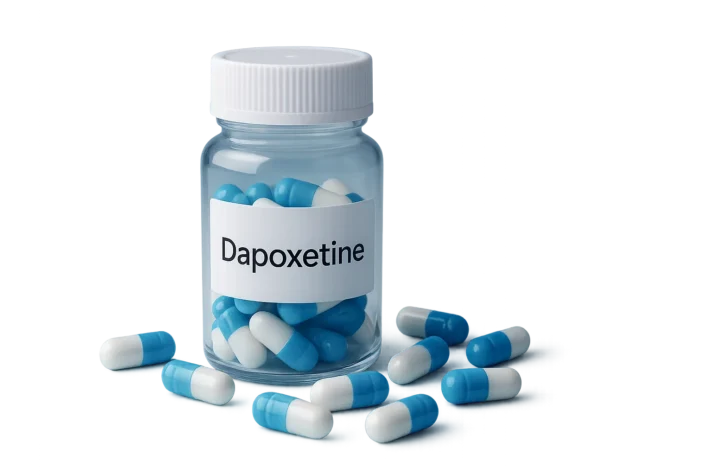
Dapoxetine is primarily used to treat premature ejaculation and is not known to cause erectile dysfunction (ED) as a common side effect. In fact, many men report improved erectile function due to reduced anxiety and better sexual control while using it. Clinical studies show that ED is rare with dapoxetine, and its targeted action does not interfere with the blood flow necessary for erections. However, individual reactions vary, and mild issues may occur in rare cases due to psychological factors, drug interactions, or pre-existing health conditions. Always consult a doctor to assess risks and ensure safe use.
When men search “does dapoxetine cause erectile dysfunction,” they’re looking for honest answers about how this medication might affect their sexual health. Erectile dysfunction (ED) is a serious issue that can impact confidence, relationships, and overall well-being. So it’s important to understand how dapoxetine fits into the picture.
The simple truth is that dapoxetine rarely causes erectile dysfunction as a direct side effect. Research from large, well-run clinical trials shows that ED is not commonly linked to this medication. Multiple randomized phase III trials of a famous study have shown that dapoxetine rarely causes erectile dysfunction as a direct side effect.[1]
Dapoxetine is a type of SSRI (selective serotonin reuptake inhibitor), mainly used to treat premature ejaculation. Many men actually report better erectile function while using dapoxetine, likely because it helps reduce anxiety and improve control during sex. Patient-reported outcomes consistently indicate improved sexual control and satisfaction during dapoxetine therapy.[2]
In short, while every medication can affect people differently, erectile dysfunction is not a typical side effect of dapoxetine, and for many, it may even help improve overall sexual performance.
In this article, we’ll explore how dapoxetine works, what research says about its link to erectile function, when issues might arise, and how to use it safely. By the end, you’ll have a clear, evidence-based understanding of its impact on male sexual health.
Understanding Dapoxetine’s Mechanism and Sexual Function Impact
Dapoxetine is part of the SSRI (selective serotonin reuptake inhibitor) family, which is a family of antidepressants [3]. But it’s quite different from traditional antidepressants like sertraline hydrochloride. Not like those medications, which are taken daily, dapoxetine is designed specifically for sexual health and is used only when needed. You take it 1 to 3 hours before sex, making it a fast-acting, on-demand treatment for premature ejaculation.
Dapoxetine works by increasing certain chemical (serotonin) levels in certain parts of the brain that control how quickly ejaculation happens.
This helps delay ejaculation and extend the time between penetration and ejaculation. (intravaginal ejaculatory latency time, IELT).[1]
In my experience, most men using dapoxetine feel more in control during sex, which naturally leads to better performance overall.
What’s more important is that dapoxetine targets ejaculation without heavily affecting the systems involved in getting or keeping an erection. It doesn’t interfere much with blood flow or the vascular responses needed for a firm erection, which means it helps with ejaculatory control without usually causing erectile dysfunction.
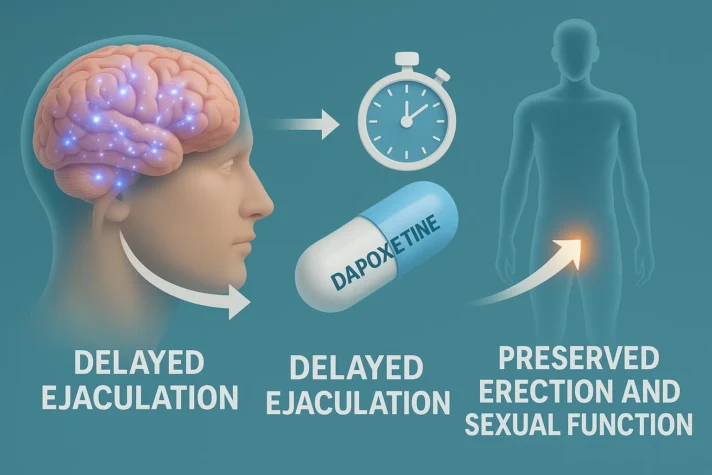
Clinical Evidence: What Research Reveals About Erectile Function
Clinical trials that carefully studied dapoxetine have checked for any sexual side effects, including erectile dysfunction (ED). According to the International Society for Sexual Medicine, large-scale studies show that erectile issues are rare among men using dapoxetine.[2]
Research using tools like the Premature Ejaculation Profile, a questionnaire that measures how men feel about their sexual performance, shows that most men either maintain or improve their erectile function while on dapoxetine.
One reason is that dapoxetine increases he time men last longer during sex (the intravaginal ejaculation latency time (IELT).[1] This boost in control often leads to greater sexual confidence, which can improve overall performance, including erections.
Clinical global impression scores, which measure a patient’s overall response to treatment, also show that erectile function tends to stay the same or even get better with on-demand dapoxetine. So, while it’s normal to worry about potential side effects, the evidence suggests that the risk of erectile dysfunction from dapoxetine is very low and often overstated.[1]
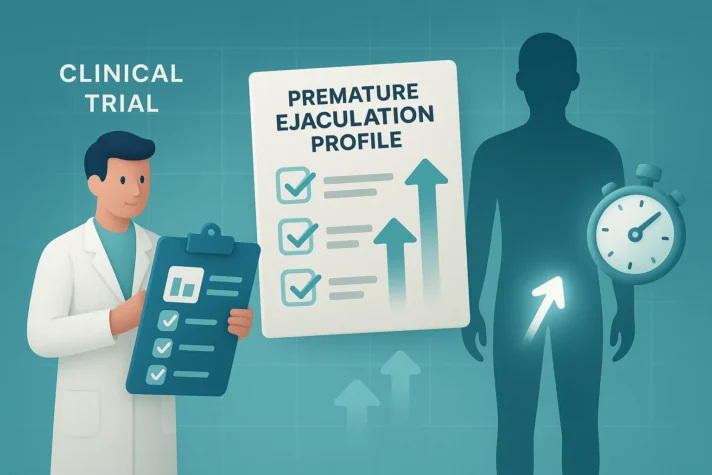
Erectile Problems and Dapoxetine
While erectile dysfunction is not a typical side effect of dapoxetine, some men may experience mild erectile difficulties. Understanding these helps identify when dapoxetine might contribute to erection problems:
Individual Medication Sensitivity
- A small number of men may have side effects like mild erectile difficulties when taking dapoxetine.
- These reactions are usually due to how each person’s body responds differently to medication, not because the drug commonly causes these issues.
- In most cases, these erectile difficulties go away with a change in dose or by switching to another treatment.
Psychological Factors and Performance Anxiety
- Worrying too much about possible side effects can actually lead to performance anxiety, which can cause erectile problems.
- This creates a cycle where stress about sexual performance makes it harder to perform, even if the medication isn’t directly causing any issues.
Drug Interactions with Other Medications
- Dapoxetine may interact with other drugs, those that affect the heart or nervous system, which can raise the chance of sexual side effects.
- Men who are taking other medications should always talk to their doctor to make sure dapoxetine is safe for them.
Underlying Health Conditions
- Health problems like heart disease, diabetes, or hormone imbalances can lead to erectile dysfunction on their own, regardless of whether a man is taking dapoxetine.
- If ED happens at the same time as dapoxetine use, it’s easy to blame the medication, but the real cause might be an existing health condition.
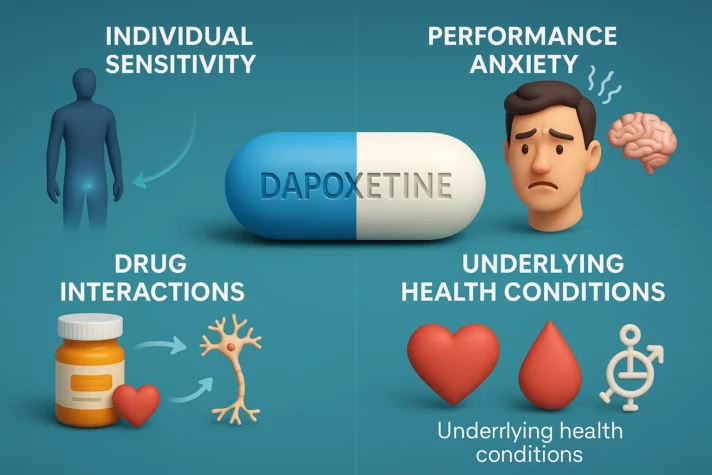
Side Effects: Beyond Erectile Concerns
The most common side effects of Dapoxetine are things like nausea, dizziness, headache, and dry mouth, none of which are directly related to erectile function.
When sexual side effects do happen, they may include:
- A temporary drop in sexual desire or libido
- Occasional trouble reaching peak sexual performance
- Mild changes in how orgasm or ejaculation feels
These effects are usually mild and tend to improve as the body gets used to the medication.
More serious side effects like orthostatic hypotension (a sudden drop in blood pressure when standing up) or liver issues are rare, but they do need medical attention and monitoring if they occur.
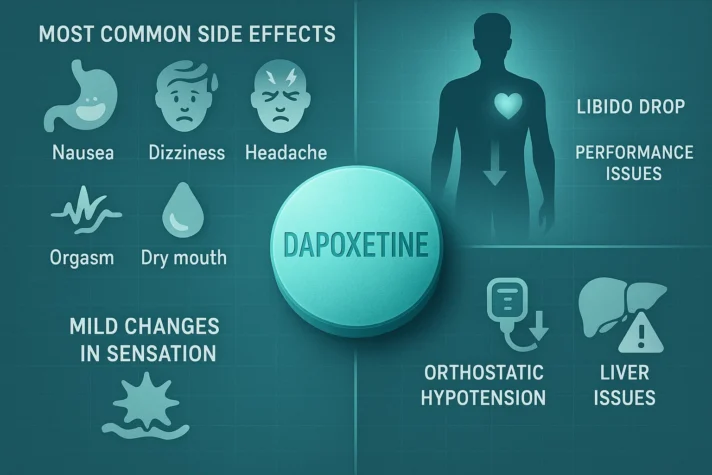
The Positive Impact on Sexual Health and Erectile Function from Dapoxetine
Anxiety Reduction
- Dapoxetine helps give men better control over ejaculation, which reduces performance anxiety.
- Performance anxiety is a common cause of erectile dysfunction.
- When men feel more in control, they’re more confident during sex, and that confidence often leads to stronger, more reliable erections.
Improved Sexual Satisfaction
- Being able to last longer during sex increases satisfaction for both partners.
- This creates a positive cycle: more satisfaction leads to more confidence, which often leads to better overall sexual performance, including erectile function.
Less Pressure and Stress
- Dapoxetine takes away the pressure of needing to finish quickly before premature ejaculation happens.
- This lets men relax and focus on enjoying the moment, which naturally supports better erections and a more enjoyable sexual experience.
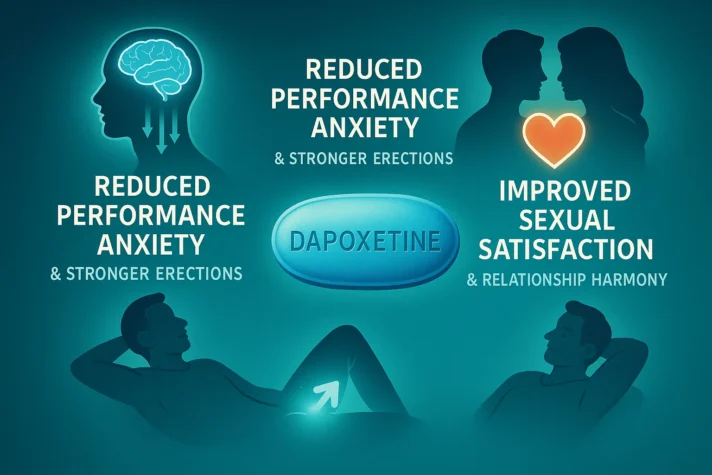
Drug Treatment Considerations and Combination Therapies
For men dealing with both premature ejaculation and erectile dysfunction, doctors may suggest a combination treatment.
Dapoxetine can be safely taken along with phosphodiesterase-5 inhibitors (PDE-5 inhibitors) medications like sildenafil (Viagra) or tadalafil (Cialis) that help increase blood flow to the penis.
These two types of medication work on different parts of sexual function:
- PDE-5 inhibitors improve erections by boosting blood flow.[4]
- Dapoxetine helps with controlling ejaculation and improving timing.
Clinical research shows that when taken under proper medical guidance, this combination is generally well-tolerated and can lead to better overall results in treating male sexual dysfunction.
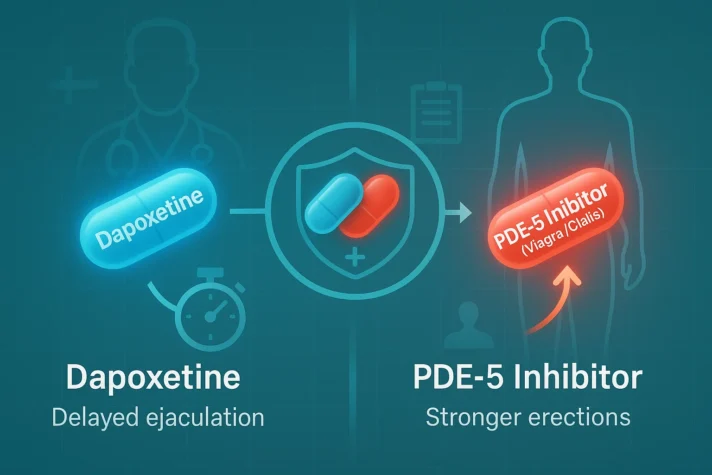
Safety Protocols and Medical Monitoring
Using dapoxetine safely means following some important health guidelines. Men with heart conditions need to be especially cautious, as dapoxetine can affect blood pressure. While these effects are usually mild, anyone with heart disease or irregular heartbeats should be closely monitored.
1. Medical History Review
Doctors should look at your full medical history and any medications you’re currently taking to avoid possible drug interactions.
2. Avoid Alcohol and Recreational Drugs
Mixing alcohol and smoking with dapoxetine can increase the risk of side effects and reduce how well the treatment works.
3. Regular Check-Ups
Follow-up appointments are important to track how well the medication is working and catch any side effects early.
By sticking to these safety steps, men can get the most benefit from dapoxetine while minimizing potential risks.
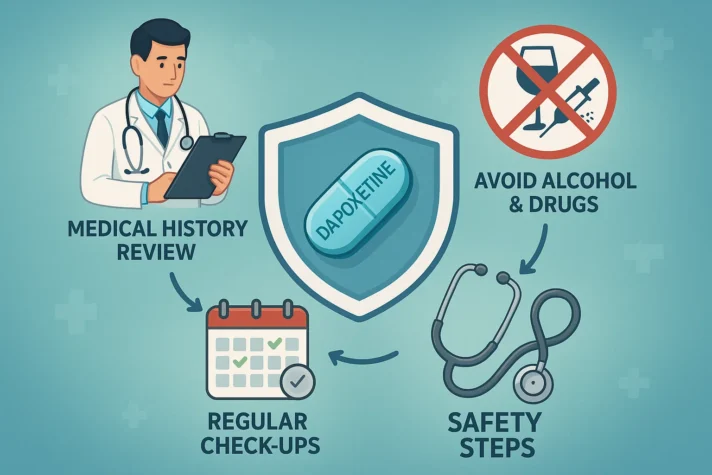
Alternative Treatment Approaches
A complete approach to sexual health often combines dapoxetine with other strategies for better results:
1. Pelvic floor exercises
Pelvic floor exercises strengthen muscles for improved ejaculatory control and long-term sexual function.
2. Topical anaesthetics
It can delay ejaculation, but must be used carefully to avoid partner numbness or reduced sensation.
3. Behavioral techniques & counseling
Help manage performance anxiety and improve control.
4. Stress reduction
Reducing stress and maintaining a healthy lifestyle supports overall sexual performance.
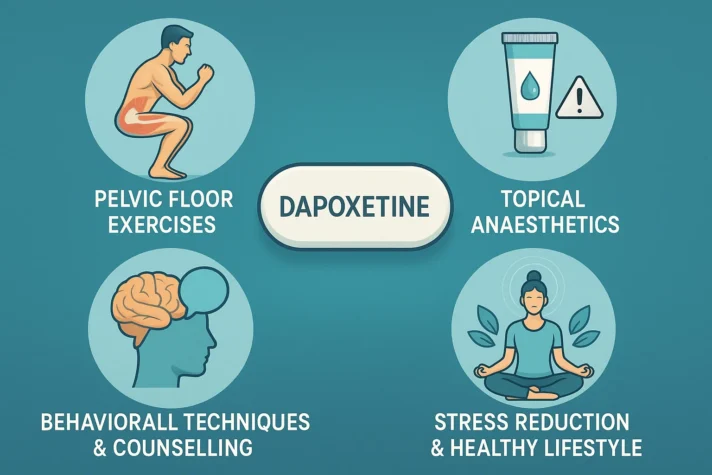
Discontinuation and Withdrawal Considerations of Dapoxetine
One key benefit of dapoxetine’s on-demand use is the low risk of withdrawal symptoms when stopping treatment. That means when someone leaves a medication, there will be no side effects. The body typically adapts to daily medications, which is why stopping suddenly can cause symptoms, but not with dapoxetine.
Unlike daily SSRIs used for depression, dapoxetine is taken only as needed, which makes it easier to stop.
Because it’s not taken every day, there’s little chance of discontinuation syndrome. Discontinuation syndrome refers to a group of symptoms that can occur when someone suddenly stops taking certain medications like SSRIs (selective serotonin reuptake inhibitors) that are used daily for conditions like depression or anxiety.
Most men can stop using it without gradually reducing the dose. You can take breaks or make changes without major side effects.
In some cases, doctors may suggest a gradual stop, depending on your health situation. This flexibility makes dapoxetine a convenient option for managing premature ejaculation.
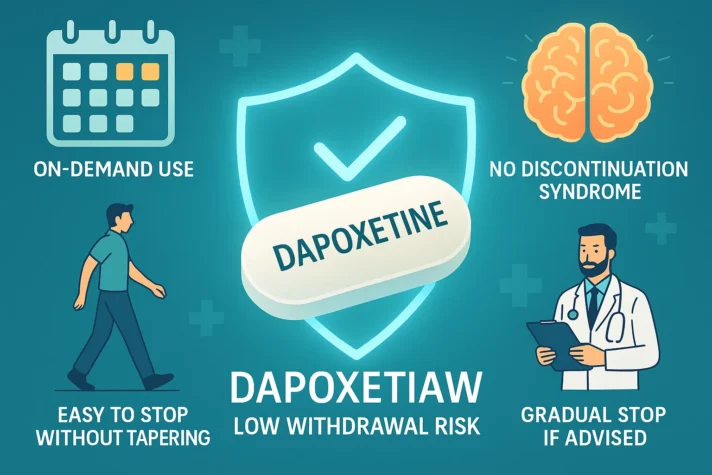
Conclusion
Dapoxetine is a safe and effective on-demand treatment for premature ejaculation that rarely causes erectile dysfunction. Unlike daily SSRIs, it is taken only when needed, offering flexibility and minimal withdrawal risk. Clinical studies show that most men maintain or even improve their erectile function while experiencing greater sexual control and satisfaction. When combined with healthy lifestyle habits or, if needed, other therapies, dapoxetine can significantly enhance both sexual performance and confidence. With proper medical guidance and monitoring, men can use dapoxetine to not only manage premature ejaculation but also improve overall sexual and emotional well-being.
"The following blog article provides general information and insights on various topics. However, it is important to note that the information presented is not intended as professional advice in any specific field or area. The content of this blog is for general educational and informational purposes only.
Book consultation
The content should not be interpreted as endorsement, recommendation, or guarantee of any product, service, or information mentioned. Readers are solely responsible for the decisions and actions they take based on the information provided in this blog. It is essential to exercise individual judgment, critical thinking, and personal responsibility when applying or implementing any information or suggestions discussed in the blog."






